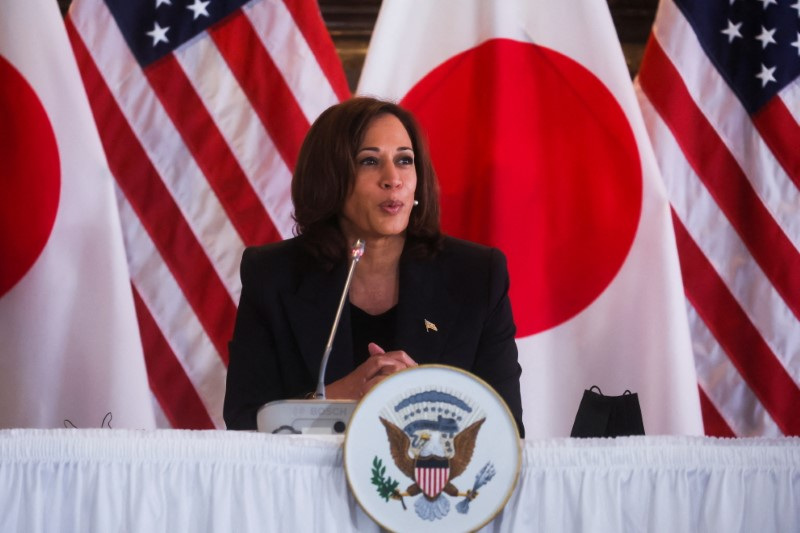By Kiyoshi Takenaka
TOKYO (Reuters) – Extra Japanese corporations imagine a Kamala Harris presidency within the U.S. can be higher for his or her companies than a second Donald Trump administration, a Reuters survey confirmed on Thursday, reflecting the respondents issues about protectionism and coverage unpredictability.
The result of November’s U.S. presidential election is being intently watched by nations all over the world. However Japan is an in depth ally of Washington, with tens of hundreds of U.S. troops stationed there, and its companies would really feel the influence of a renewed U.S.-China commerce conflict since each are amongst its prime buying and selling companions.
Some 43% of Japanese companies stated they most popular Harris in gentle of their company methods and enterprise plans whereas 8% picked Trump.
A complete of 46% stated both candidate can be fantastic, with the remaining 3% saying they most popular neither.
“There is a possibility that trade war, economic friction and security threats will be brought about under another Trump administration, forcing us to change our business strategy,” a supervisor at a ceramics producer wrote within the survey.
Japan’s relations with the Trump administration had been at occasions strained by his calls for for extra funds in the direction of navy help and by commerce tensions.
With Harris, “we can expect current policies to be maintained by and large. That would give us better visibility into the future,” an official at a chemical compounds agency stated.
Requested what change will seemingly be crucial beneath a Trump administration, 34% stated their international alternate technique would should be reviewed, whereas 28% stated their provide chains can be realigned and 21% stated they would scale back their China operations.
Trump has floated the concept of a ten% common tariff on U.S. imports, which may disrupt worldwide markets, and a tariff of not less than 50% on Chinese language items.
Analysis reached out to 506 corporations from July 31 to Aug. 9 on behalf of Reuters for the survey, with 243 companies responding.
CHINA SLOWDOWN
No matter who wins the U.S. election, 13% of Japanese corporations are contemplating decreasing operations in China, whereas 3% are wanting into increasing their companies, with 47% planning to keep up their present publicity, the survey confirmed.
Amongst these serious about paring down operations in China, 35% stated they noticed no prospects for financial restoration, 29% cited robust worth competitors and one other 29% pointed to financial safety dangers as causes to chop again.
China’s economic system grew a lot slower than anticipated within the second quarter and its exports rose at their slowest tempo in three months in July, including to issues in regards to the outlook for its huge manufacturing sector.
Main Japanese corporations which have introduced cutbacks of their China operations in current months embody Honda (NYSE:) Motor and Nippon Metal.
The survey additionally confirmed 24% of respondents noticed current rounds of intervention within the international alternate market by Japanese authorities as acceptable, in contrast with 9% that discovered the strikes inappropriate and 64% that believed they had been unavoidable.
The yen stored falling earlier this yr regardless of intervention in April and Could, touching a 38-year low of 161.96 to the greenback on July 3. Japanese authorities are suspected to have stepped in once more in mid-July to place a flooring beneath the yen.
“The extreme weakness in the yen had to be corrected. It just couldn’t be helped,” an official at an electronics firm stated.
Requested if the Financial institution of Japan ought to elevate rates of interest to shore up the yen, 51% stated such a step was allowed solely when alternate charges fluctuated excessively, whereas 22% stated they did not assist a financial coverage change geared toward affecting the international alternate market.

On expectations for the yen, 32% noticed it buying and selling in a spread of 145 to 150 yen to the greenback on the finish of the yr, whereas 25% predicted the Japanese forex to be firmer at 140 to 145 yen, whereas 22% noticed it buying and selling between 150 to 155 yen.
Through the interval of the survey, the yen was risky and touched its strongest stage because the begin of the yr earlier than reversing course. It has since continued to weaken.




